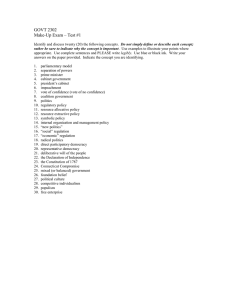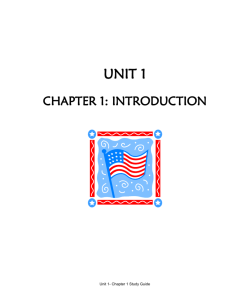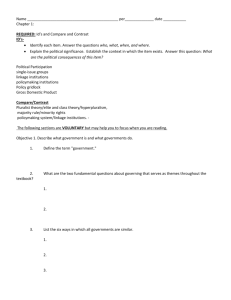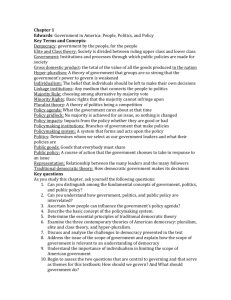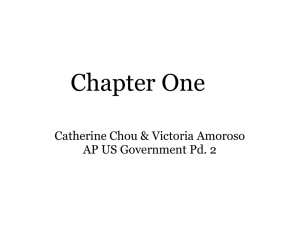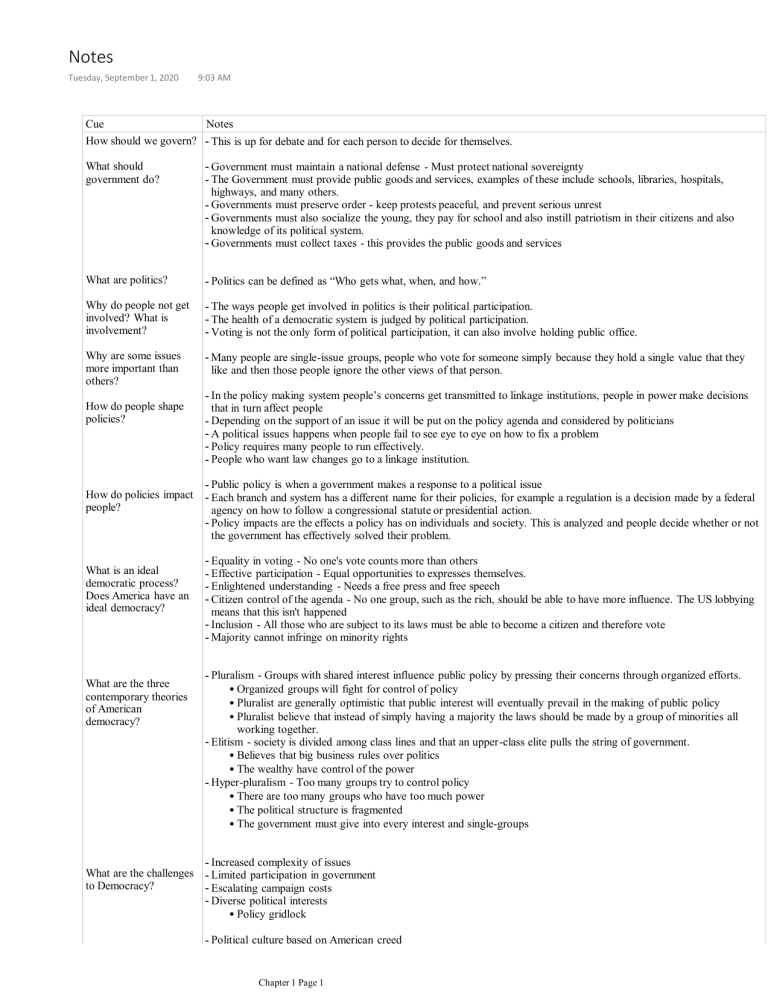
Notes Tuesday, September 1, 2020 Cue 9:03 AM Notes How should we govern? - This is up for debate and for each person to decide for themselves. What should government do? - Government must maintain a national defense - Must protect national sovereignty - The Government must provide public goods and services, examples of these include schools, libraries, hospitals, highways, and many others. - Governments must preserve order - keep protests peaceful, and prevent serious unrest - Governments must also socialize the young, they pay for school and also instill patriotism in their citizens and also knowledge of its political system. - Governments must collect taxes - this provides the public goods and services What are politics? - Politics can be defined as “Who gets what, when, and how.” Why do people not get involved? What is involvement? - The ways people get involved in politics is their political participation. - The health of a democratic system is judged by political participation. - Voting is not the only form of political participation, it can also involve holding public office. Why are some issues more important than others? - Many people are single-issue groups, people who vote for someone simply because they hold a single value that they like and then those people ignore the other views of that person. How do people shape policies? How do policies impact people? What is an ideal democratic process? Does America have an ideal democracy? What are the three contemporary theories of American democracy? - In the policy making system people’s concerns get transmitted to linkage institutions, people in power make decisions that in turn affect people - Depending on the support of an issue it will be put on the policy agenda and considered by politicians - A political issues happens when people fail to see eye to eye on how to fix a problem - Policy requires many people to run effectively. - People who want law changes go to a linkage institution. - Public policy is when a government makes a response to a political issue - Each branch and system has a different name for their policies, for example a regulation is a decision made by a federal agency on how to follow a congressional statute or presidential action. - Policy impacts are the effects a policy has on individuals and society. This is analyzed and people decide whether or not the government has effectively solved their problem. - Equality in voting - No one's vote counts more than others - Effective participation - Equal opportunities to expresses themselves. - Enlightened understanding - Needs a free press and free speech - Citizen control of the agenda - No one group, such as the rich, should be able to have more influence. The US lobbying means that this isn't happened - Inclusion - All those who are subject to its laws must be able to become a citizen and therefore vote - Majority cannot infringe on minority rights - Pluralism - Groups with shared interest influence public policy by pressing their concerns through organized efforts. • Organized groups will fight for control of policy • Pluralist are generally optimistic that public interest will eventually prevail in the making of public policy • Pluralist believe that instead of simply having a majority the laws should be made by a group of minorities all working together. - Elitism - society is divided among class lines and that an upper-class elite pulls the string of government. • Believes that big business rules over politics • The wealthy have control of the power - Hyper-pluralism - Too many groups try to control policy • There are too many groups who have too much power • The political structure is fragmented • The government must give into every interest and single-groups - Increased complexity of issues What are the challenges - Limited participation in government to Democracy? - Escalating campaign costs - Diverse political interests • Policy gridlock - Political culture based on American creed Chapter 1 Page 1 What are the American political cultures? - Political culture based on American creed • Liberty ○ No oppression ○ Freedom of speech and religion • Egalitarianism ○ Everyone deserves equal opportunity and respect • Individualism ○ It's up to the individual to create their own destiny • Laisssez-faire ○ Government takes a hand's off approach • Populism ○ The government is for the people America is split down part lines when it comes to how active we should be vs. how active we are. How active is American Stats: government? - The American government spends about 3.8 trillion dollars a year - It employs 2.7 million civilians, as well as 1.4 million militarily - It owns about 1/3 of the land in the US - It occupies over 3.2 billion square feet of office space All of this spending coupled with lack of taxes has led to a federal debt over 19 trillion dollars. Summary 1.1 The functions that all governments perform include maintaining a national defense, providing public services, preserving order, socializing the young, and collecting taxes. By performing these functions governments regularly shape the way we live. 1.2 Politics determine what leaders we select and what policies they pursue. The who of politics is the voters, candidates, parties, and groups; the what is the benefits and burdens of the government; the how is the various ways in which people participate in politics. 1.3 The policy making system is in effect a cycle. Citizens' interests and concerns are transmitted through linkage institutions (parties and elections, interest groups, the media). These concerns shape the government's policy agenda, from which those in policymaking institutions (Congress, the presidency, the courts) choose issues to address. The policies that are made (laws, executive orders, regulations, and court judgments) the influence people's lives. 1.4 According to traditional democratic theory, the ideal democracy is characterized by "one person, one vote," equal opportunities to participate, freedom of speech and the press, citizen control of the policy agenda, and inclusion. Pluralist theory holds that American democracy works well, as competition among many organized groups means that the public interest becomes public policy This view is disputed by elitist theory, which claims that the powerful few dominate, and by hyperpluralist theory, which sees the excessive influence of many competing groups as leading to muddled policy or inaction. Contemporary challenges to American and other democracies include the complexity of issues today, citizens' limited participation, escalating campaign costs, and the policy gridlock resulting from diverse political interests. 1.5 One of the most important issues facing modern American democracy is the proper scope of government. Politicians constantly debate whether the scope of government responsibilities is too vast, just about right, or not comprehensive enough. This debate concerns whether the goals that are agreed to be important are best achieved through government action or rather through means other than government. Chapter 1 Page 2
